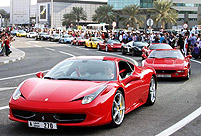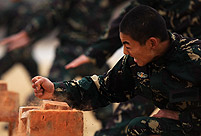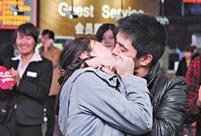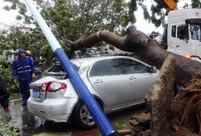While the Nov. 19 constituent assembly (CA) election in Nepal has just been concluded recording the highest turnout so far, the high cost involved prompted worries among economist.
The Election Commission (EC) along with representatives from all contesting political parties have begun to count ballot papers, while results of some constituencies have already been revealed.
The cost involved and expenditures made for the second CA polls is tentatively estimated to be 2.5 percent of this poor Himalayan country's total gross domestic product (GDP) whose size of economy is worth 170 billion Nepalese currency (1.88 billion U.S. dollars), according to economists and analysts.
There are doubts if the upcoming CA, which will also perform as parliament, could deliver constitution paving way towards the political stability and lasting peace and security, economists are worried about the extravagant money put in to hold Tuesday's election and its impact on the economy of this least developed country (LDC).
The government had allotted 16 billion Nepalese currency to conduct election, of which the Nepali Finance Ministry has already provided 12 billion Nepalese currency to the EC.
During the first CA polls in 2008, the government initially had earmarked 3 billion Nepalese currency, which however had been doubled later.
A total of 10 billion Nepalese currency had been spent in 2008 polls which is going to go up by more than four-fold this time when the entire results of the votes will be unveiled, stakeholders comment.
"Due to the soaring inflation, higher turnouts of the voters and more logistics and longer time, I do not feel the election would be fully concluded with the government allocated Rs 16 billion," senior economist Rameshwor Khanal told Xinhua.
A total of 6,218 candidates raced under the first-past-the-post (FPTP) election system who had been permitted to spend up to Rs 1 million each. This means they have already spent around 6.12 billion Nepalese currency, if they obeyed the limitation to spend.
However, there were enough media reports stating some candidates spent up to around 500 percent more than allowed by the EC.
"This is not the end. The election results are yet to come. Once the results are out, the victorious parties and candidates will offer grand feasts to their cadres and voters in some hi-fi restaurants across the country," a vice president of FNCCI told Xinhua preferring anonymity.
He said, "sadly, such a large amount of money is being spent for the election which still does not guarantee the drafting of the constitution."
"Compared to the economy of Nepal, the money being spent for the election is one of the largest expenditure in the world for the purpose of drafting constitution," economist Bishamvar Pyakurel, told Xinhua.
Analysts said large chunk of amount allotted for the election are being spent mainly for consumption, especially of food and liquor. Since the beginning of campaigns, the political parties have been offering parties for their cadres and general public almost every day.
Economist Pyakurel added the general public has suffered most since the CA polls took the country to its grip. "The inflation has been doubled. Low income group are having hardships to continue their livelihoods while the supply side constraint have put consumers upon the razors' edge," he said.
He said the inflation has already gone double digit since the political parties went extravagant.
Economists said the main challenge the government will have to face after the election will be to contain the ballooning inflation, the failure of which will prompt social and economic chaos in the country which already has suffered a decade long civil war.
 Luxury-cars parade held in Dubai
Luxury-cars parade held in Dubai Special forces take tough training sessions
Special forces take tough training sessions Fire guts 22-storey Nigeria commercial building in Lagos
Fire guts 22-storey Nigeria commercial building in Lagos Singles Day:
Singles Day:  Temperature drops dramatically in Beijing
Temperature drops dramatically in Beijing Typhoon Haiyan hits south China's Hainan
Typhoon Haiyan hits south China's Hainan Top 10 celebrity moms in China
Top 10 celebrity moms in China Weekly Sports Photos:
Weekly Sports Photos: Gingko leaves turn brilliant golden yellow in Beijing
Gingko leaves turn brilliant golden yellow in Beijing Maritime counter-terrorism drill
Maritime counter-terrorism drill Love searching stories in cities
Love searching stories in cities Male belly dancer in women’s fitness club
Male belly dancer in women’s fitness club  15 best rivers for travelers in world
15 best rivers for travelers in world National Geographic Traveler Photo Contest
National Geographic Traveler Photo Contest Weekly Sports Photos
Weekly Sports PhotosDay|Week|Month